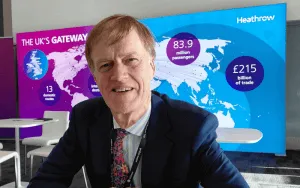The minister for social security and disability has struggled to point to any significant achievements on disability equality after more than a year in post, but he insisted that the government does not need a separate minister for disabled people.
The Labour government has been consistently criticised for not appointing a stand-alone minister for disabled people and instead combining that role with the social security brief under Sir Stephen Timms.
But in an interview with Disability News Service (DNS) at this week’s annual Labour conference in Liverpool, Sir Stephen (pictured) struggled to point to any significant achievements in the 14 months since his appointment, excluding employment and work and pensions issues.
Asked for three key achievements, he pointed first to the publication in July of new five-year plans to improve the use of British Sign Language (BSL) by government departments.
This followed the British Sign Language Act, a private members’ bill introduced under the last Conservative government, which legislated for the government to report on how departments use BSL in their communications.
He also pointed to the government signing the Solfagnano Treaty (PDF) – a watered-down version of the UN disability convention – during a G7 ministerial meeting in Italy last October.
The treaty appears to have been mentioned just once in parliament – last December – since it was signed, and has been almost completely ignored by politicians, the media, and disabled people.
Sir Stephen also highlighted the “preparations” the government was making for a “cross-government plan” on disability.
Asked why there did not appear to have been any discussions with disabled people’s organisations about this plan, he said: “Internally, there’s been lots of discussion, and the fruits of that will become apparent in the coming months.”
Asked about the lack of progress in his role as disability minister, he said: “I think a lot’s been done, actually.
“And I’m hoping that the fruit of that will become increasingly apparent as time goes on.”
He said he did not believe his job – with responsibility for both social security and disability – was too extensive, and he said predecessors under Conservative governments also had responsibilities that were “actually quite wide” and extended outside the “strict disability group”.
But disabled activists at the conference – and outside it – repeated the long-standing calls for a separate minister for disabled people.
Emily Pomroy-Smith, a member of Disability Labour’s executive committee, told DNS that disabled people had been calling repeatedly for a separate minister to cover disability, which was a “very, very important” demand.
She said: “The brief is massive, and it is too big for one person to do on their own.
“We would [also] prefer it wasn’t sat under the Department for Work and Pensions.”
Disabled activist Klint Durham, who took part in a Disabled People Against Cuts protest outside the conference on Monday (see separate story), said he would also like to see a stand-alone minister for disabled people.
He said the remit of that post would need to cover areas across government, including housing, transport, employment and community engagement.
A note from the editor:
Please consider making a voluntary financial contribution to support the work of DNS and allow it to continue producing independent, carefully-researched news stories that focus on the lives and rights of disabled people and their user-led organisations.
Please do not contribute if you cannot afford to do so, and please note that DNS is not a charity. It is run and owned by disabled journalist John Pring and has been from its launch in April 2009.
Thank you for anything you can do to support the work of DNS…

 Minister admits signing off on order that led to widespread cuts to Access to Work
Minister admits signing off on order that led to widespread cuts to Access to Work All the evidence from Labour conference points in one direction: More cuts to disability benefits
All the evidence from Labour conference points in one direction: More cuts to disability benefits Labour ignores disabled people and accessible housing crisis – again – as it announces plans for new towns
Labour ignores disabled people and accessible housing crisis – again – as it announces plans for new towns